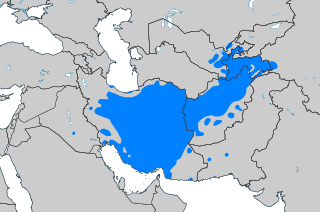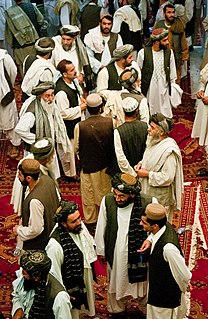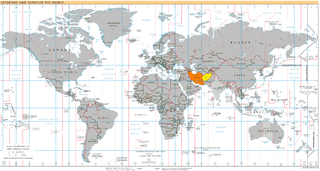
Afghanistan, officially the Islamic Emirate of Afghanistan, is a landlocked country located at the crossroads of Central and South Asia. Referred to as the Heart of Asia, it is bordered by Pakistan to the east and south, Iran to the west, Turkmenistan to the northwest, Uzbekistan to the north, Tajikistan to the northeast, and China to the northeast and east. Occupying 652,864 square kilometers (252,072 sq mi) of land, the country is predominately mountainous with plains in the north and the southwest, which are separated by the Hindu Kush mountain range. As of 2021, its population is 40.2 million, composed mostly of ethnic Pashtuns, Tajiks, Hazaras, and Uzbeks. Kabul is the country's largest city and serves as its capital.

The foreign relations of Afghanistan are in a transitional phase since the 2021 fall of Kabul to the Taliban and the collapse of the internationally-recognized Islamic Republic of Afghanistan. No country has recognised the new regime, the Islamic Emirate of Afghanistan. Although some countries have engaged in informal diplomatic contact with the Islamic Emirate, formal relations remain limited to representatives of the Islamic Republic.

Persian, also known by its endonym Farsi, is a Western Iranian language belonging to the Iranian branch of the Indo-Iranian subdivision of the Indo-European languages. Persian is a pluricentric language predominantly spoken and used officially within Iran, Afghanistan and Tajikistan in three mutually intelligible standard varieties, namely Iranian Persian, Dari Persian and Tajiki Persian. It is also spoken natively in the Tajik variety by a significant population within Uzbekistan, as well as within other regions with a Persianate history in the cultural sphere of Greater Iran. It is written officially within Iran and Afghanistan in the Persian alphabet, a derivation of the Arabic script, and within Tajikistan in the Tajik alphabet, a derivation of the Cyrillic script.

Herāt is an oasis city and the third-largest city of Afghanistan. In 2020, it had an estimated population of 574,276, and serves as the capital of Herat Province, situated south of the Paropamisus Mountains in the fertile valley of the Hari River in the western part of the country. An ancient civilization on the Silk Road between the Middle East, Central and South Asia, it serves as a regional hub in the country's west, and its historic Persian influences has given it the nickname as Afghanistan's Little Iran.

The Taliban, which also refers to itself by the name of its state, the Islamic Emirate of Afghanistan, is a Deobandi Islamic fundamentalist, militant Islamist, and jihadist political movement in Afghanistan. It ruled approximately three-quarters of the country from 1996–2001, before being overthrown following the United States invasion. It recaptured Kabul on 15 August 2021 after years of insurgency, and currently controls all of the country.

Pashtuns, also called Pakhtuns or Pathans and historically known as Afghans, are an Iranian ethnic group who are native to Central Asia and South Asia. Pashtuns are the 26th-largest ethnic group in the world, and the largest segmentary lineage society. There are an estimated 350–400 Pashtun tribes and clans with a variety of origin theories.

Tajiks are a Persian-speaking Iranian ethnic group native to Central Asia, living primarily in Afghanistan, Tajikistan, and Uzbekistan. Tajiks are the largest ethnicity in Tajikistan, and the second-largest in Afghanistan and Uzbekistan. They speak varieties of Persian, a Western Iranian language. In Tajikistan, since the 1939 Soviet census, its small Pamiri and Yaghnobi ethnic groups are included as Tajiks. In China, the term is used to refer to its Pamiri ethnic groups, the Tajiks of Xinjiang, who speak the Eastern Iranian Pamiri languages. In Afghanistan, the Pamiris are counted as a separate ethnic group.
Dari, or Dari Persian, is a political term used for the various dialects of the Persian language spoken in Afghanistan and by two and a half million people in Pakistan and Iran. Dari is the term officially recognised and promoted since 1964 by the Afghan government for the Persian language, hence it is known as Afghan Persian or Eastern Persian in many Western sources. As Professor Nile Green remarks "the impulses behind renaming of Afghan Persian as Dari were more nationalistic than linguistic" in order to create an Afghan state narrative. Apart from a few basics of vocabulary, there is little difference between formal written Persian of Afghanistan and Iran. The term "Dari" is officially used for the characteristic spoken Persian of Afghanistan, but is best restricted to formal spoken registers. Some Persian-speakers in Afghanistan prefer to still call their language “Farsi”.

Pashto, is an Eastern Iranian language in the Indo-European language family. It is known in historical Persian literature as Afghani.

Tajik, also called Tajiki Persian, Tajiki, and Tadzhiki, is the variety of Persian spoken in Tajikistan and Uzbekistan by Tajiks. It is closely related to neighbouring Dari with which it forms a continuum of mutually intelligible varieties of the Persian language. Several scholars consider Tajik as a dialectal variety of Persian rather than a language on its own. The popularity of this conception of Tajik as a variety of Persian was such that, during the period in which Tajik intellectuals were trying to establish Tajik as a language separate from Persian, prominent intellectual Sadriddin Ayni counterargued that Tajik was not a "bastardised dialect" of Persian. The issue of whether Tajik and Persian are to be considered two dialects of a single language or two discrete languages has political sides to it.

The Economic Cooperation Organization or ECO is an Asian political and economic intergovernmental organization which was founded in 1985 in Tehran by the leaders of Iran, Pakistan, and Turkey. It provides a platform to discuss ways to improve development and promote trade and investment opportunities. The ECO is an ad hoc organisation under the United Nations Charter. The objective is to establish a single market for goods and services, much like the European Union. Following the dissolution of the Soviet Union, the ECO expanded to include Afghanistan, Azerbaijan, Kazakhstan, Kyrgyzstan, Tajikistan, Turkmenistan and Uzbekistan in 1992.

Afghan refugees are citizens of Afghanistan who were compelled to abandon their country as a result of major wars, persecution, torture or genocide. The 1978 Saur Revolution followed by the 1979 Soviet invasion marked the first wave of internal displacement and international migration from Afghanistan to neighboring Iran and Pakistan; smaller numbers also went to India or to the former Soviet Union. Between 1979 and 1992, more than 20% of Afghanistan's population fled the country as refugees. When the Soviet forces left Afghanistan in 1989, many began returning to their homeland. They again migrated to neighboring countries during and after the Afghan Civil War (1992–1996) but between 2002 and 2022 most have returned to Afghanistan.
The Quds Force is one of five branches of Iran's Islamic Revolutionary Guard Corps (IRGC) specializing in unconventional warfare and military intelligence operations. U.S. Army's Iraq War General Stanley McChrystal describes the Quds Force as an organization analogous to a combination of the CIA and the Joint Special Operations Command (JSOC) in the United States. Responsible for extraterritorial operations, the Quds Force supports non-state actors in many countries, including Hezbollah, Hamas, Palestinian Islamic Jihad, Yemeni Houthis, and Shia militias in Iraq, Syria, and Afghanistan.

UTC+04:30 is an identifier for a time offset from UTC of +04:30.

Iran–Pakistan relations covers the bilateral relations between the adjacent states of Iran and Pakistan. After Pakistan gained its independence in August 1947, Iran was one of the first countries to recognize its sovereign status. Relations between Shi'a-majority Iran and Sunni-majority Pakistan became greatly strained due to sectarian tensions in the 1980s, as Pakistani Shi'a Muslims claimed that they were being discriminated against under the Sunni-biased Islamization program being imposed throughout Pakistan by the military dictatorship government of then-President, General Muhammad Zia-ul-Haq. Following the 1979 Islamic Revolution, Iran and Saudi Arabia gradually began to use Pakistan as a battleground for their proxy sectarian conflict, and Pakistan's support for the Deobandi Taliban organization in Afghanistan during the civil wars in the 1990s became a problem for Shi'a Iran, which opposed a Taliban-controlled Afghanistan.

Relations between Afghanistan and Iran were established in 1935 during King Zahir Shah's reign and the shah of Iran Reza Shah Pahlavi, though ties between the two countries have existed for millennia. As a result, many Afghans speak Persian, as Dari is one of the official languages of Afghanistan, and many in Afghanistan also celebrate Nowruz, the Persian New Year.

Gnorimoschema is a genus of moths in the family Gelechiidae.
Afghans in Iran are citizens of Afghanistan who are temporarily residing in Iran as refugees or asylum seekers. The first wave of Afghans were admitted to Iran after the start of the Soviet–Afghan War in 1979. According to the United Nations High Commissioner for Refugees (UNHCR), there are 780,000 registered Afghan refugees residing in Iran as of October 2020, most of whom were born and raised in Iran during the last four decades. There are also about 586,000 Afghan tourists, travelers, merchants, exchanged students, migrant workers, and others.

Liwa Fatemiyoun, literally "Fatimid Banner", also known as Fatemiyoun Division or Fatemiyoun Brigade, is an Afghan Shia militia formed in 2014 to fight in Syria on the side of the Syrian government.The group's officially designated purpose, is the defense of the shrine of Zaynab bint Ali, and to fight "takfiri terrorists" in Syria, which would come to include the Islamic State (IS). It is funded, trained, and equipped by the Islamic Revolutionary Guard Corps (IRGC), and fights under the command of Iranian officers. Both the Fatemiyoun Brigade and the Iranian government downplay their relationship with one another, despite clear coordination and the brigade's operation under the auspices of the IRGC. Liwa Fatemiyoun is also closely associated with Hezbollah Afghanistan.

The capture of Zaranj, the capital of Nimruz Province, Afghanistan, occurred on 6 August 2021. According to the local officials, only the National Directorate of Security (NDS) and its forces had put up a fight against the Taliban, but they too eventually surrendered to the Taliban. Local officials had been requesting for reinforcements but received no response. Zaranj was the first provincial capital to be taken by the Taliban in their 2021 offensive and the first one to be captured since Kunduz in 2016.















